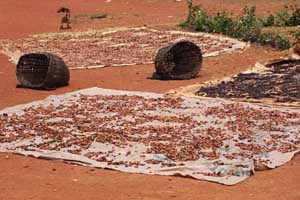|
Failure to recognize forest user rights in Cameroon likely to drive deforestation, poverty & conflict

The recent upgrading of Takamanda Forest Reserve, in south west Cameroon, to a National Park, has seen a shift in livelihood strategies for local communities, from the sustainable harvest of non-timber forest products to the production of cash crops, primarily cocoa (pictured).
The Takamanda Forest Reserve, in south west Cameroon, has been upgraded to a National Park, thanks to the technical and financial support of a partnership coordinated by the Ministry of Forests and Wildlife that includes several development institutions and conservation NGOs. The partnership seeks to integrate conservation and development objectives.
However, according to CIFOR researcher Nathalie van Vliet, the process undertaken for the creation of Takamanda National Park has failed to take into account local concerns about restrictions in user rights within the protected area. It seems that development plans implemented in several communities in and around the protected area will not sufficiently compensate for the loss of these user rights. more
REDD goes green

Photo by Eko Prianto
Indonesia’s globally important biosphere, Tanjung Puting National Park (TPNP), could serve as a potential site for demonstrating a range of activities for reducing carbon emissions from deforestation and forest degradation (REDD).
The finding was made in a preliminary survey by CIFOR’s Daniel Murdiyarso. It comes at a time when environmentalists have been expressing concerns about the impact of oil palm development on the 400,000 ha park.
TPNP, in Central Kalimantan, is well known for its orangutan rehabilitation centre run by the Orangutan Foundation International (OFI), six hours via road and river from the district capital, Pangkalan Bun. more
Previous Highlights »
|
|

More than 900 people attended Forest Day 2 on December 6 at the UNFCCC COP 14 in Poznan, Poland. Hosted by CIFOR, the Collaborative Partnership on Forests (CPF), the Government of Poland & the Polish State Forests NFH, the event was a major milestone on the road to COP 15 in Copenhagen in December 2009, where a post-Kyoto climate agreement will be finalized. more
Related links:
- Summary
of Forest Day 2 (PDF, 327KB)
- CIFOR-COP14 Online
Press Room
- Forest Day 2 reported by IISD
|
|

|
|
 |
 |
|
|

|
 |
|
|
|

|
Diaw, C.; Aseh, T.; Prabhu, R. 2009. In Search of Common Ground: Adaptive Collaborative Management in Cameroon. xx, 475pCenter for International Forestry Research (CIFOR), Bogor, Indonesia. ISBN: 978-979-1412-65-0.
E-Files :
 PDF Complete File :
English ( size 3.9 MB )
PDF Complete File :
English ( size 3.9 MB )
details..
|
|
|

|
McDougall, C.; Ojha, H.; Banjade, M.R.; Banjade, M.R.; Pandit, B.H.; Bhattarai, T; Maharjan, M.R.; Rana, S. 2008. Forests of learning: Experiences from research on an Adaptive Collaborative Approach to community forestry in Nepal. xii, 110pCenter for International Forestry Research (CIFOR), Bogor, Indonesia. ISBN: 978-979-14-1277-3.
E-Files :
 PDF Complete File :
English ( size 2.1 MB )
PDF Complete File :
English ( size 2.1 MB )
details..
|
See more publications
|
|